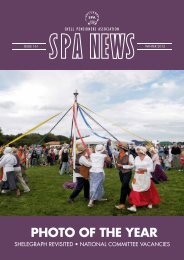Create successful ePaper yourself
Turn your PDF publications into a flip-book with our unique Google optimized e-Paper software.
Bombay street<br />
– even more interesting! The worldwide<br />
crude shortages caused by the Yom<br />
Kippur War only increased the pressure.<br />
We arrived in Bombay only a few months<br />
after the end of the 1971 Indo-Pakistan<br />
war and at the tail-end of a poor monsoon.<br />
This had serious implications for the city,<br />
which received a large proportion of its<br />
electricity from hydro-electric schemes. As<br />
time wore on we suffered restrictions on<br />
the use of air-conditioning, and poor<br />
harvests due to the inadequate monsoon<br />
rains meant rising food prices, leading to<br />
labour unrest and several general strikes<br />
or “bandhs”. These were usually one-day<br />
affairs but meant that we had to stay in<br />
the plant for 36 hours at a time to maintain<br />
operations. I usually volunteered for the<br />
night shifts, which were very pleasant.<br />
We had an occasional requirement for<br />
diving operations when repairs were<br />
needed to our big salt water intake<br />
pumps, and developed a good<br />
relationship with frogmen from the Indian<br />
Navy who, not long before, had been<br />
in action in Karachi harbour. After a few<br />
successful diving operations at the<br />
refinery, the company donated a<br />
television to their mess – a huge luxury,<br />
as TV had only just started in India. We<br />
formally presented this to them on board<br />
their vessel in Bombay naval dockyard<br />
and had the opportunity to take a look<br />
at the navy’s latest ship – a locally-built<br />
licensed copy of a British “Leander” class<br />
frigate. Of even more interest sitting out<br />
in the harbour was the light cruiser INS<br />
Delhi – formerly HMNZS Achilles of<br />
‘Battle of the River Plate’ fame.<br />
My wife Nancy and I had a spacious<br />
flat in the senior staff colony near the<br />
refinery, which eventually (after some<br />
nagging of Camp Services) became<br />
quite smart and comfortable. Our<br />
neighbours were a wonderfully diverse<br />
group of Indian families from all parts<br />
of the country and of every religion. Most<br />
were very sociable and we began to<br />
appreciate the huge diversity of Indian<br />
culture and cuisine. Nancy was in<br />
demand to teach the basics of English<br />
cookery – especially roast dinners –<br />
which became a regular midweek<br />
cookery class. This eventually developed<br />
into a series of weekend lunch parties<br />
featuring delicious cuisine from the<br />
various regions of India. One particularly<br />
gorgeous biryani required the<br />
preparation to start on Thursday evening<br />
to be ready for lunch on Sunday!<br />
Everyone naturally recommended that<br />
we should visit their home region. With<br />
only two weeks’ local leave in our twoyear<br />
contract this was going to be a tall<br />
order. However, with the amount of<br />
overtime we worked during major<br />
shutdowns, my very understanding boss<br />
let us take more leave than was due.<br />
Our leaves usually coincided with one<br />
or other element of the transport system<br />
going on strike, which didn’t help with<br />
planning; however, we managed a big<br />
circuit of the South, including Bangalore,<br />
Mysore, Madras (now Chennai), and<br />
Kerala. In the latter, we stayed in Cochin<br />
and had an overnight visit to a tea<br />
plantation whose generator was<br />
powered by an old Crossley gas engine<br />
Water Taxi<br />
FEATURE ARTIcLE<br />
– probably installed by my grandfather!<br />
Later on, we spent a week in Kashmir<br />
living on a houseboat on the Dal Lake<br />
in Srinagar, and towards the end of our<br />
stay spent a few days in Delhi, from<br />
where we visited Agra, including a visit<br />
to the Taj Mahal.<br />
By the time we left Bombay in September<br />
1974, India was in deep economic<br />
trouble. A few months later, the foreign<br />
oil companies were nationalised and<br />
Burmah-<strong>Shell</strong> became Bharat Petroleum.<br />
Mrs Gandhi declared a state of<br />
emergency, which stabilised the<br />
economy but at great cost to individual<br />
freedom, especially for the working<br />
classes. We always believed that<br />
economic liberalisation and investment<br />
would enable India to move forward<br />
rapidly, and although it has taken so<br />
long, it’s great to see the progress now<br />
being made.<br />
<strong>SPA</strong> NEWS | 19



